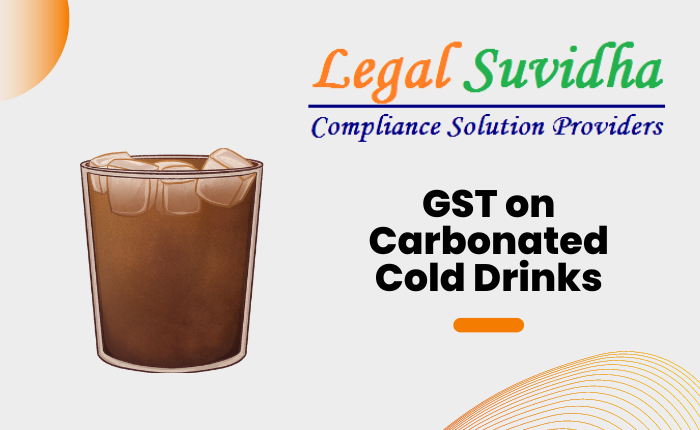Notification No. 01/2021-Compensation Cess (Rate), which was issued by the Central Board of Indirect Taxes and Customs (CBIC) on September 30th, 2021, has brought about a significant change in the taxation of carbonated beverages containing fruit drinks or fruit juice under the Goods and Services Tax (GST) regime in India. According to this notification, a 12% Compensation Cess is now mandated on such products.
- For entrepreneurs planning to venture into the carbonated cold drink business or any other beverage-related enterprise, it becomes imperative to obtain GST registration and fully comprehend the implications of GST on carbonated cold drinks.
- The GST system in India is a unified tax that has replaced several pre-existing taxes, streamlining the taxation process.
- Under this system, carbonated cold drinks are classified as “sin goods” and are subject to a higher tax rate. Presently, these products are taxed at a total rate of 40%, comprising a 28% GST and an additional 12% compensation cess.
- It is worth noting that the GST rate on carbonated cold drinks was initially set at 12%. However, in September 2021, the GST Council made the decision to increase it significantly to the current rate of 28%, in addition to the 12% compensation cess.
- The decision to raise the GST rate on carbonated cold drinks has sparked mixed reactions among the public. Some argue that the higher tax rate is justifiable as these beverages are often considered luxury items.
- On the other hand, there are concerns about its potential impact on lower-income families, who may bear a larger burden due to increased prices.
GST Rates on Other Beverages and Drinks
| Rates (%) | Products Description | HSN Codes | Export and Import HSN Codes |
|---|---|---|---|
| NIL | Water [other than aerated, mineral, purified, etc.] | 2201 | 22011010, 22011020, 22019090 |
| NIL | Non-alcoholic Toddy, Neera including date and palm neera | 2201 | 22011010, 22011020, 22019090 |
| 18% | Waters, including natural or artificial mineral waters | 2201 | 22011010, 22011020, 22019090 |
| 18% | Ethyl alcohol and other spirits denatured | 2207 | 22071011, 22071019, 22071090, 22072000 |
| 5% | Ethyl alcohol supplied to Oil Marketing Companies | 2207 | |
| 18% | Vinegar and substitutes for vinegar obtained from acetic acid | 2209 | 22090010, 22090020, 22090090 |
| NIL | Tender coconut water (without a registered brand name) | 22029090 | – |
| 5% | Tender coconut water (with a registered brand name or bearing brand) | 22029090 | – |
| 18% | Other non-alcoholic beverages | 22029090 | – |
| 12% | Beverages containing milk | 22029030 | – |
| 12% | Fruit pulp or fruit juice-based drinks | 22029020 | – |
| 12% | Soya milk drinks | 22029010 | – |
| 18% | Other non-alcoholic beverages (excluding tender coconut water) | 22029100 | – |
| 18% | Other non-alcoholic beverages (excluding tender coconut water) | 22029990 | – |
| 28% | Others | 22021090 | – |
| 28% | Lemonade | 22021020 | – |
| 28% | Aerated Waters | 22021010 | – |
| 5% | Ice and snow | 22019010 | – |
| 28% | All goods (including aerated waters) with added sugar/flavoring | 220210 | – |
The Non-Alcoholic Beverage Industry Appeals for Reduced Taxes on Fruity Drinks
The Indian Beverage Association (IBA), representing major companies like Coca-Cola and Pepsico, has submitted a formal request to the government, urging them to reconsider the categorization of fruit-based carbonated drinks as “sin” goods, a category that currently includes unhealthy products.
- At present, all carbonated beverages, irrespective of their ingredients, are subjected to high sin taxes.
- The IBA’s proposition aims to exempt fruit-based fizzy drinks from this category and, instead, apply a lower Goods and Services Tax (GST) rate of either 12 or 18 percent to these beverages.
- Furthermore, the IBA is engaging in discussions with the Food Safety and Standards Authority of India (FSSAI) to establish distinct standards for sugar-free and sugary beverages. By doing so, they intend to highlight the nutritional differences between various non-alcoholic drinks and tailor regulations accordingly.
- The IBA emphasizes that labeling fruit-based fizzy drinks as sin goods has contributed to a negative public perception. They argue that this perception adversely affects the non-alcoholic beverage industry and hampers its potential for growth.
- Acknowledging this concern, the IBA has garnered support from the food processing ministry and has reached out to several states, advocating for similar adjustments in the tax structure.
- One of the key points asserted by the IBA is that higher sin taxes do not significantly impact consumer behavior.
- They contend that taxing carbonated fruit drinks at elevated rates is not an effective solution to combat the obesity issue, as these beverages contribute only a marginal portion of calories to the average diet.
In conclusion, the Indian Beverage Association seeks a reevaluation of the tax system, proposing a more nuanced approach that takes into account the nutritional composition of non-alcoholic drinks. By lowering taxes on fruity beverages and creating separate standards for different drink types, they aim to bolster the industry’s standing and promote a more balanced and informed consumer choice in the country’s beverage market.
If You have any queries then connect with us at [email protected] or [email protected] & contact us & stay updated with our latest blogs & articles










